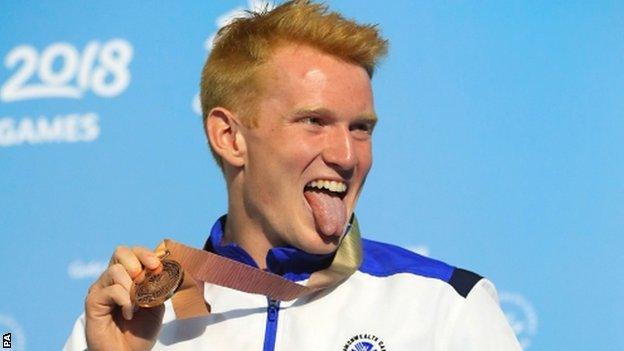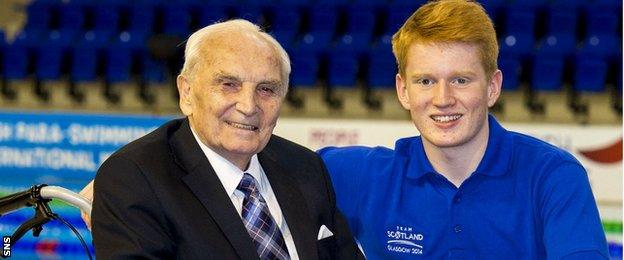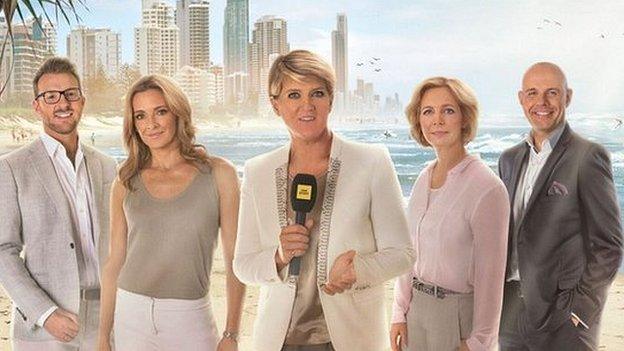Commonwealth Games: James Heatly family affair swells Scottish success
- Published

James Heatly celebrated winning a bronze - 60 years after his grandfather won Scotland's last Commonwealth diving medal
Young James Heatly has a bit of a way to go to match his grandfather's legacy in the Commonwealth Games, but in taking bronze on the diving board on Wednesday, he's made a fine start.
All he needs to do now to emulate the great man, Sir Peter, is win four more medals, then get appointed as Scotland's assistant team manager, then team manager, then vice-chairman of the organising committee, then team manager again, then team commandant, then chairman of the Commonwealth Games Federation, then life vice-president.
Truth be told, it's a bit of an ask.
Before his death in 2015, Sir Peter had an involvement in 17 consecutive Commonwealth Games going back 64 years. No doubt, his spirit would have been in the air around the Heatly family at the Aquatic Centre when James was doing his thing and winning Scotland's first diving medal since Peter the patriarch was in his pomp.
James' father, Robert, tells a story. "My father carried the flag for Scotland in his third Commonwealth Games in 1958 in Cardiff," he says.
"The general team manager that year was a guy called Jim Grossart. Jim's neighbour was Ally McGregor, a former Scotland international swimmer. At my dad's funeral, Ally told us that Jim's widow had given him the flag that dad had carried in '58 and Ally presented it to James. It's a good luck charm. My dad encouraged James to get into diving, They would sit and have little chats."

The late Sir Peter Heatly pictured with grandson James shortly before the 2014 Games in Glasgow
The flag was brought to the Gold Coast and if you looked carefully you might have seen it waving when the bronze medal was won. What a moment for the Heatly family. Sixty-eight years after winning their first Commonwealth Games medal and 60 years after winning their last, they're back on the podium again.
This was a day when Scotland matched and then beat their target of 29 medals. Linda Pearson's bronze in the shooting made it 29 and not even a glorious amalgam of history's greatest mystics could have foreseen the identity of the athlete who would take Scotland to 30.
Dave 'The Rave' McMath, a 21-year-old engineer, whose profile in the preamble was not exactly of Eilidh Doyle proportions, literally fired Scotland into a new high in terms of number of medals won at a foreign Games.
By taking gold in the double trap shooting, the Scots had beaten their much-stated goal. It was their seventh gold to go with the 10 silver and 13 bronze already won.
McMath wins double trap gold for Scotland
Later, Heatly would make it 31 and Maria Lyle would make it 32 in the T35 100m at Carrara Stadium. With Reece McFadden winning his flyweight boxing quarter-final and John Docherty winning in the middleweight division, both of them are now in the medals as well. They're guaranteed a bronze at least. That's effectively 34 in the bag.
All of this moved the chair of Commonwealth Games Scotland, Paul Bush, to say that it was a "privilege" to be involved with this team.
"People might say that 29 was too easy a target, but it wasn't," said Bush. "It was a number based on scientific analysis. We have two more guaranteed medals in the boxing, so I think we'll kick on towards 35 pretty soon. If we got to 40 I'd be completely ecstatic.
"We have seven gold and we won 11 gold in Melbourne so we'd like to get close to that. It would be the real icing on the cake if we managed it, but it will be tough.
"I actually think it's been harder to win medals in some sports here than it was in Glasgow. Undoubtedly, there's been a resurgence in Australian sport. They've probably pushed themselves back on to the world stage. They certainly have done in cycling and swimming. They were world class.
"Remember that we had an influence on the programme in Glasgow. We could front-load the events to get momentum and also backload it to give ourselves chances at the end. It wasn't by chance that Hannah Miley, Ross Murdoch and Michael Jamieson were swimming on the first night and that the judo kicked in very early. It was all planned, but coming here we didn't have the power to do that. We had to live with somebody else's picks.
"It was tougher to get momentum but we got it with Marc Austin. It was harder to get medals in the pool because the Australians have been world class and they've had 10,000 people behind them while baying for our blood, but the swimmers did brilliantly."
Commonwealth Games: Scotland's 'Cinderellas' beat Nigeria to make basketball semi-finals
Between athletes and support staff, the Scotland travelling party numbers is almost 400. It has cost around £1.75m to get them here, to house them, to kit them out, to give them the facilities and the coaching and the care they need to perform. It's a fact, though, that one of the great feel-good stories is also one of the most troubling.
The basketball men created history by becoming the first team from Scotland to qualify for a semi-final in the Commonwealth Games. They did it with precious little funding and with the bare minimum support staff compared to other team sports like netball and hockey.
Basketball has lived a life of second-class citizens and yet they are four wins from four games and now have a semi-final against the host nation on Saturday. Their journey so far is an inspirational one of triumph over adversity.
For too long there has been lip service paid to basketball in Scotland and the wider UK. One of the wishes going forward is that the Gold Coast marks a turning point for a great sport that could fly if only those with influence over the purse strings showed a little more respect to what it could do for the youth of the country.
While we salute the Duncan Scotts and Mark Stewarts and Katie Archibalds, there is another great tale happening on the basketball court. Medal or no medal, captain Kieron Achara and his team will endure as one of the highlights.
- Published11 April 2018
